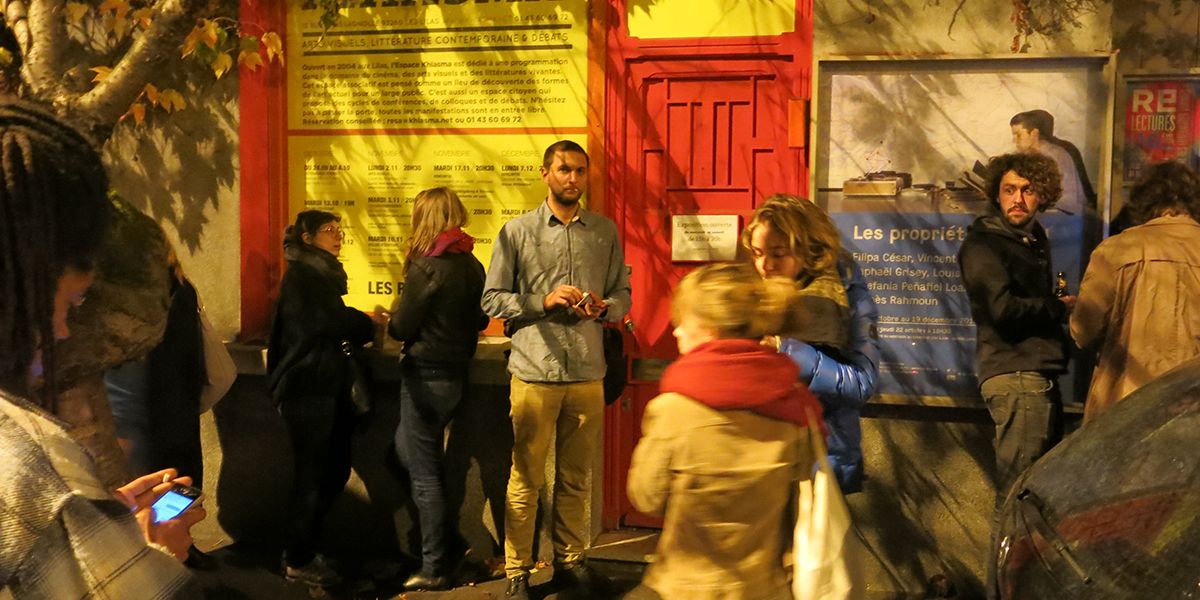- 3 min
When a small-scale independent art centre like Espace Khiasma closes in the Paris suburbs, in the district of Seine-Saint-Denis specifically, it is necessarily a sign of the times. Of times when that and those that it defended and strived to render visible – artists, authors, thinkers or boiling issues, undesirable inhabitants, minoritarian practices, experiences of art or of forms of life and hospitality – cruelly lack a voice in a faltering society.
It is the end of a history, but perhaps not only that of one individual place. Perhaps also that of a territory, and its concrete utopias. Watch this space. Khiasma was nurtured, as were many of its colleagues, by the fertile land of a suburb that had made sure it had the means to talk and look into the eyes of all those who have made of fear their business.
Europe’s richest region has today become the least welcoming, aimlessly wandering from one electoral fantasy to another, the spectre of a culture brought onto all regardless of individuals’ lives and what knowledge they produce. The tired voter has become the only inhabitant of this map. And exhaustion the only confused form of consent. Meanwhile, the Grand Paris invents itself in a new amnesic colonisation of poor territories, trampling a terra nullius, waiting for the next revolts of the indigenous genius still breathing under the polished concrete. This can only bring back some memories, in a time when others talk of reconciliation with Africa – without grandpa's gross after-thoughts, it goes without saying. So each and everyone builds their own little world on the elites’ playground, while the public authority stands applauding the lesson of the rich, a docile spectator no longer interrogating a weakness it has integrated as a disease. And it is said, over dessert in a bourgeois dinner, that the emplois aidés (government hiring incentives for non-profit organisations) are decidedly of no use to anyone, without a look for the servants who move about in silence and pour the drinks, saluting this slightly acid joke that will soon become law. Surprised by the sudden announcement, advisers rush to send out vague analyses, botched out during the night, proving by science what the master’s voice said. The voice is viral, its policy is speed. And it is for the cleaner, crossing the suburb at dawn, a hard-fought public transport pass in hand, to find the leftovers, still fuming, of this fine decision, laying on a tired table.
Khiasma’s closing down thus doesn’t just concern Khiasma, but all art and cultural organisations that built themselves in the fragile economy of projects, where applications and reports take up more time than what we owe to transmission, to relation, to creating a community. Where we are doomed either to pretend or to perish from giving too much. We saw it settle at the end of the 90s and it is here now, this fine disastrous economy that has no use but to feed a blinded machine. A lack of the stable funding that a cultural public service mission would call for, a desire of the political that leaves no more space to delegating, to true innovation, to looking for understandings in the long-term, to a practice of arguing with a population that knows more than the 24-hour news channels’ flashes.
This whole music sounds out of tune, and even the orchestra knows it. The sector’s professionalization now serves only the desires of cultural watchdogs, security guards of art’s sensitive experiences. We need to catch our breaths because we have run a lot without ever a moment’s respite. And thus we unknowingly condoned this cultural economy that kills us, this ever-shrinking blanket we pull in every direction. And the only solution then offering itself to us was to invent a place of consumption, a little cultural industry, desirable and obedient, that would pretend not to leave out dangerous presences and bodies. We think there are other possible paths. We need to stop running to explore them and discover what culture could become, in a world that decides to no longer accelerate and becomes aware of its limits. And, in doing so, invents a new ecology of practices, another way of sharing and producing a common good. And the lives that go with it. The political word has become pure speed, it must cease to run through us effortlessly, it must feel the matter we are made of, of which is made the place that lives within us, a jagged hospitality, an alloy blessed with memory.
It’s the end of the road for Khiasma. One must learn to disappear. To become a fable acting with agency, a poison. For others to replay, undo and redo elsewhere. Yours truly won’t be begging for its survival. That’s the way it is. Leftovers of a class consciousness, as one would have said in the 20th century. We will soon be waking over the elegant dead body, winking at us from the bottom of its coffin. Moving away from the light in its footsteps. To those who took mandate to destroy, we say we have made alliances with the dead, that we cherish the ash that nurtures future becomings. To those who have made of violence an economy, and shine the statues of bankers, we say we will return in another body and with another dirty face. It isn’t common to say goodbye this way, one would like a platform from which to demand something. We demand nothing. We are here.
So it’s nothing other than goodbye, and see you soon.
Olivier Marboeuf was artistic director of a zombie place named Khiasma, opened in 2001 perhaps in Les Lilas, Seine-Saint-Denis, in the vibrant heart of the French Capitalist Republic.
